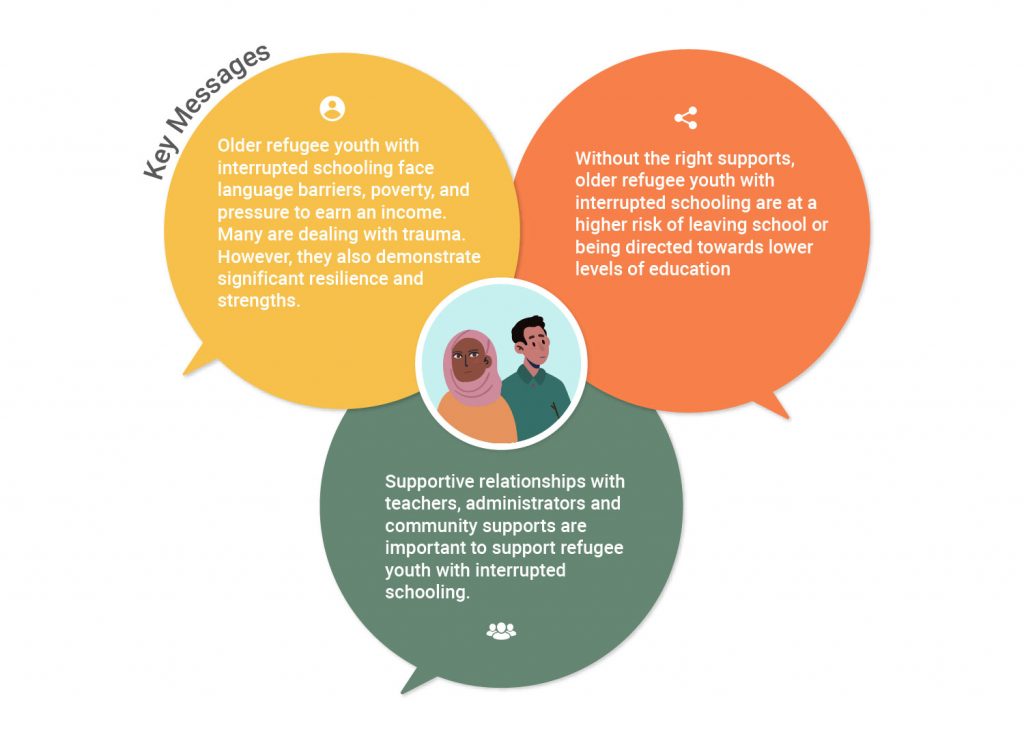Supported Transitions: Effective Educational Approaches for Older
Refugee Youth with Interrupted Schooling
Researchers: Nicole Jowett1, Noelle DePape2, Adbikheir Ahmed3, and Ray Silvius4
Affiliation: Newcomer Education Coalition (NEC)1, Manitoba Association of Newcomer Serving Organizations (MANSO) 2, Immigration Partnership Winnipeg (IPW)3, and the University of Winnipeg4
Research Partner: NEC, IPW, MANSO, and Community Engaged Research on Immigration Network
Keywords: refugee youth, interrupted schooling, Winnipeg, Manitoba, school support
Jump to: Full Infographic, Methodology, Findings, Publications & Reports
Summary
Objective: This study examined approaches to supporting older refugee youth with interrupted schooling in a Winnipeg context. Through sharing community voices and using local, national, and international examples, this research uncovered constructive, community-informed programming and policy ideas to address the needs of this group of youth.
Justification: Older refugee youth with interrupted schooling face unique challenges due to multiple, interconnected barriers beyond learning a new language. Students with interrupted formal education (SIFE) have had limited access to quality education and tend to enter the Canadian education system with language, academic, and literacy (LAL) learning needs. In Manitoba, this group of youth represents a small but often high-needs portion of refugee students.
Practical goal: This study developed an educator and community-informed ‘best practices’ document regarding the challenges facing refugee youth within the education systems and how to develop responses to better incorporate and serve refugee youth.
Primary audience: Educators, service providers, and policy makers.
Infographic Excerpt

Methodology
This study employed a community-engaged methodology through their partnership with the Newcomer Education Coalition (NEC). In addition to literature review, the study relied on two main methods of data collection data. Firstly, researchers compiled and synthesized information developed by NEC, including information from ‘older newcomer youth interrupted school’ forums, workshops, public outreach, and training, with statistics from the province of Manitoba on the scope and scale of interrupted schooling among refugee youth and other relevant information from Immigration Partnership Winnipeg (IPW). Secondly, interviews and focus groups were conducted with personnel in the education system, including superintendents, principals, resource teachers, etc., and with refugee youth and their families.
Findings
This study found that educational programming and supports which help students with interrupted formal education (SIFE) transition through a continuum of options are necessary. In Winnipeg, educational approaches to SIFE tend to be focused within mainstream high schools for initial and ongoing programming. In this context, there are many positive practices being implemented by dedicated educators. At the same time, collaboration and communication can be enhanced to strengthen and expand available programming and supports both within and beyond high schools. Partnerships at multiple levels are important not only to provide vital funding from various government departments but also to identify and coordinate complementary forms of school and community support. Communication and support are also necessary for youth and their families to be aware of their options and how to navigate pathways to further education and employment. Collaboration is essential to leverage government funding, community capacity, and the strength of youth themselves so that youth can thrive.
Recommendations:
Develop Transitional Programming Options:
- Provide and promote a flexible range of transitional programming options for youth.
- Offer vocational programs with targeted language support.
- Ensure that young adult SIFE (18-25) in each division have access to free young adult-specific programming options to equip them with the requirements for post-secondary education.
Facilitate Targeted Extended Learning and Extensive Supports:
- Ensure consistent communication and strong support for transition and pathway planning, particularly in terms of post-secondary credit requirements.
- Collaborate to offer extended learning opportunities with targeted language support.
- Invest in extra help, wraparound supports, and cultural-linguistic supports, but also develop community-based supports such as volunteers and mentors for SIFE.
Enhance School and Community Collaboration and Partnerships
- Ensure all schools, particularly LAL magnet schools, have a whole-school approach in place for all staff to support SIFE.
- Adopt strategies and policies for a whole-community approach to supporting SIFE, prioritizing communication and collaboration with families and communities.
- Seek diversified funding sources for extended learning and supports, direct financial supports, and needs-based pilot projects.
This research continues in a new CYRRC project focused on students with interrupted formal education in Manitoban small centres outside of Winnipeg. Click here to read
Explore more projects


